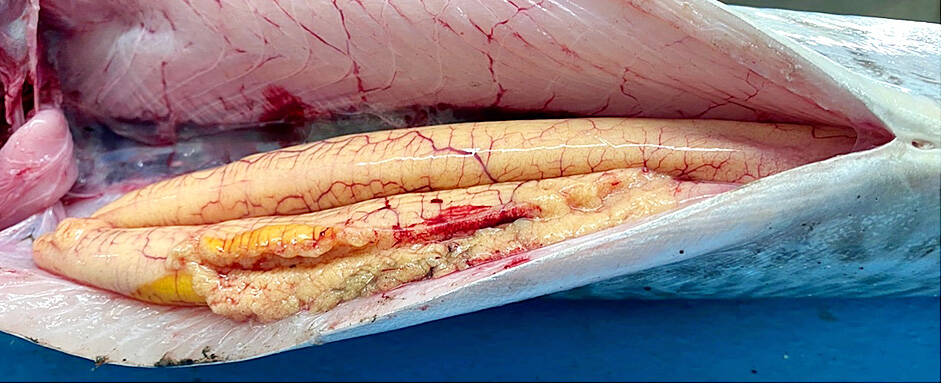Taiwan has achieved a world first in aquaculture by rearing artificially fertilized narrow-barred Spanish mackerel, the Fisheries Research Institute said.
The institute has been raising artificially inseminated fish for 600 days, with some weighing up to 7kg and measuring up to 80cm in length, it said in a news release.
In April and May 2023, the institute made a breakthrough in the artificial fertilization of mackerel larvae using onboard artificial insemination off Penghu County.

Photo courtesy of the Fisheries Research Institute
The experiment was the world’s first successful land-based larviculture of the species, it said.
The first batch of fry were raised in land-based tanks for about 50 days after hatching, setting a world record, although they subsequently suffered from a high mortality rate due to the species’ aggressive nature, collisions with tank walls and jumping out of the tanks.
The institute on Wednesday said that researchers had optimized survival conditions and have cultivated the fish for more than 600 days.
The fish samples also had testes and ovaries, demonstrating the potential for transporting them to land-based ponds for further breeding in captivity, it added.
The research puts the goal of land-based, full-cycle artificial breeding of the species for farming purposes well within reach, it said.
The research has been published in the journal Aquaculture International, showcasing Taiwan’s advances in aquaculture technology, it said.
Narrow-barred Spanish mackerel, or Scomberomorus commerson, is a popular food item in Taiwan and a highly valuable fishery resource.
Prices soar over the Lunar New Year holiday, when one fish could sell for more than NT$10,000, the report said.
The research aimed to provide an alternative to wild-caught mackerel, as catches have been declining in the past few years, with the total catch dropping from 6,600 tonnes in 2002 to just 522 tonnes in 2023, it said.
The species’ scarcity is due to changes in the maritime environment, high demand and overfishing, it added.
The International Union for Conservation of Nature classified the species as “near threatened” in 2023.

The Chinese Communist Party (CCP) is pushing for residents of Kinmen and Lienchiang counties to acquire Chinese ID cards in a bid to “blur national identities,” a source said. The efforts are part of China’s promotion of a “Kinmen-Xiamen twin-city living sphere, including a cross-strait integration pilot zone in China’s Fujian Province,” the source said. “The CCP is already treating residents of these outlying islands as Chinese citizens. It has also intensified its ‘united front’ efforts and infiltration of those islands,” the source said. “There is increasing evidence of espionage in Kinmen, particularly of Taiwanese military personnel being recruited by the

ENTERTAINERS IN CHINA: Taiwanese generally back the government being firm on infiltration and ‘united front’ work,’ the Asia-Pacific Elite Interchange Association said Most people support the government probing Taiwanese entertainers for allegedly “amplifying” the Chinese Communist Party’s propaganda, a survey conducted by the Asia-Pacific Elite Interchange Association showed on Friday. Public support stood at 56.4 percent for action by the Mainland Affairs Council and the Ministry of Culture to enhance scrutiny on Taiwanese performers and artists who have developed careers in China while allegedly adhering to the narrative of Beijing’s propaganda that denigrates or harms Taiwanese sovereignty, the poll showed. Thirty-three percent did not support the action, it showed. The poll showed that 51.5 percent of respondents supported the government’s investigation into Taiwanese who have

Left-Handed Girl (左撇子女孩), a film by Taiwanese director Tsou Shih-ching (鄒時擎) and cowritten by Oscar-winning director Sean Baker, won the Gan Foundation Award for Distribution at the Cannes Critics’ Week on Wednesday. The award, which includes a 20,000 euro (US$22,656) prize, is intended to support the French release of a first or second feature film by a new director. According to Critics’ Week, the prize would go to the film’s French distributor, Le Pacte. "A melodrama full of twists and turns, Left-Handed Girl retraces the daily life of a single mother and her two daughters in Taipei, combining the irresistible charm of

South Korean K-pop girl group Blackpink are to make Kaohsiung the first stop on their Asia tour when they perform at Kaohsiung National Stadium on Oct. 18 and 19, the event organizer said yesterday. The upcoming performances will also make Blackpink the first girl group ever to perform twice at the stadium. It will be the group’s third visit to Taiwan to stage a concert. The last time Blackpink held a concert in the city was in March 2023. Their first concert in Taiwan was on March 3, 2019, at NTSU Arena (Linkou Arena). The group’s 2022-2023 “Born Pink” tour set a